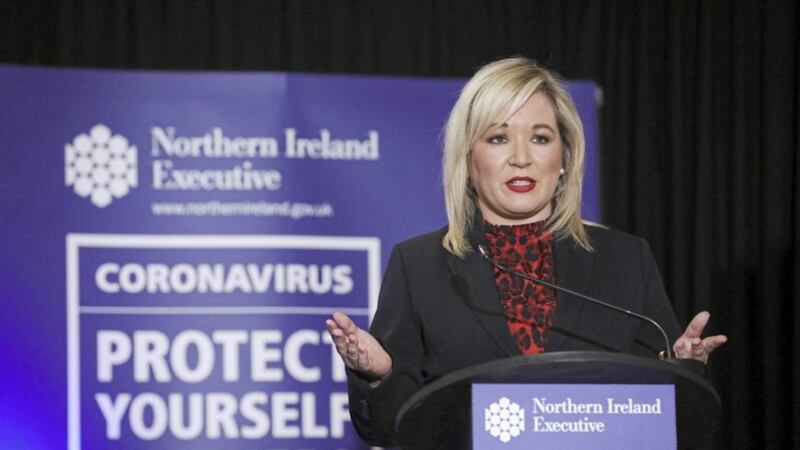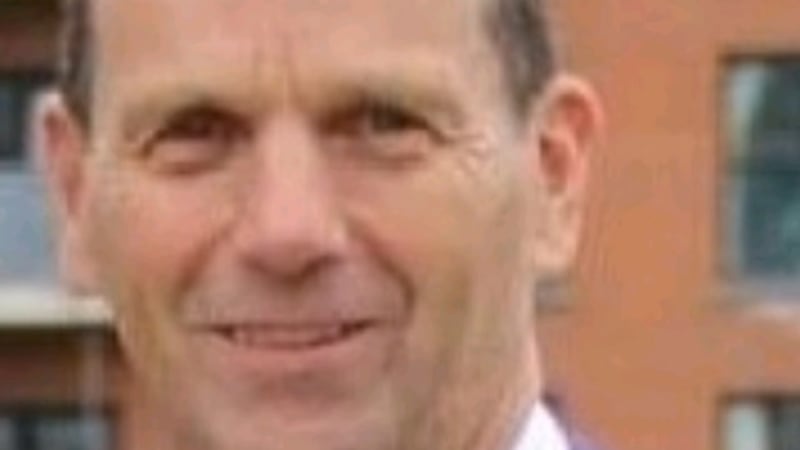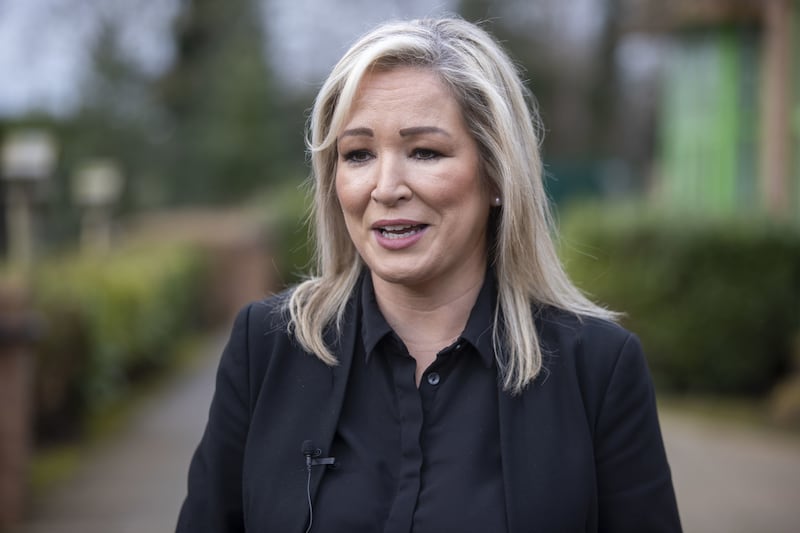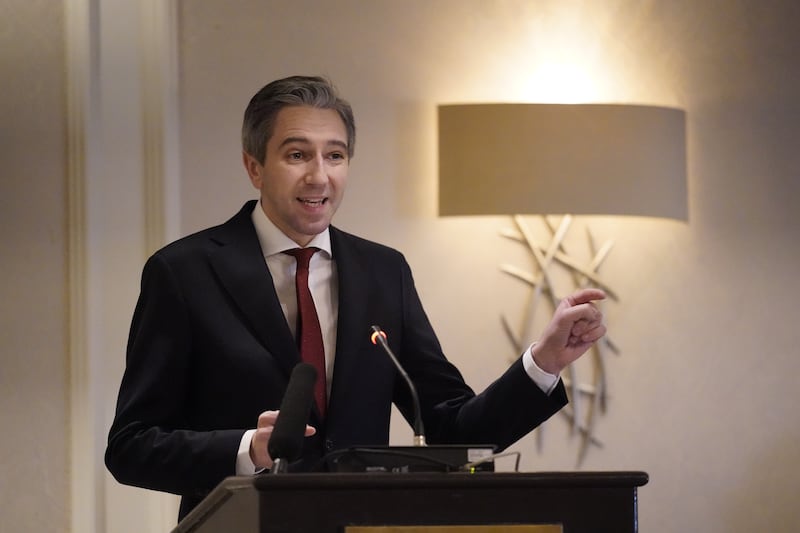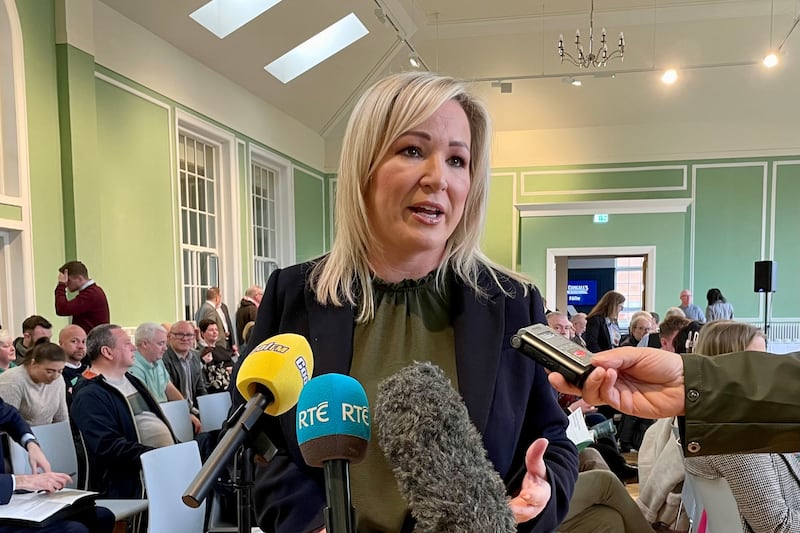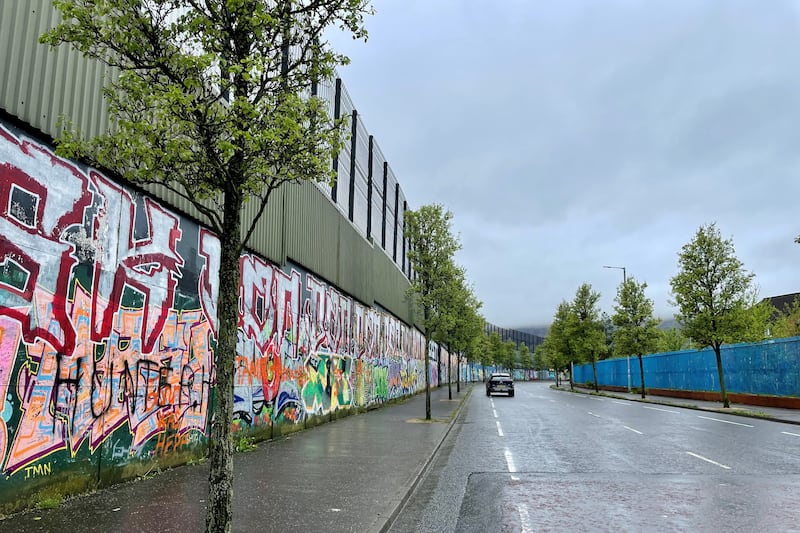SPECULATION around how Northern Ireland can emerge from stringent lockdown restrictions has been building for weeks - with the executive's 'recovery plan' kept firmly under wraps.
The document was due to be unveiled last Thursday but pulled due to fears about infection rates not being low enough.
For Deputy First Minister Michelle O'Neill, any easing off will "gradual" from what she accepts has been a "draconian" but necessary set of measures to suppress Covid-19.
Sinn Féin's deputy leader is also aware the public is "desperate" for clarity on the issue.
"I'm very conscious of the fact that people want some hope and as I keep saying, they want to see some light at the end of the tunnel because this is so hard to do," she said.
"But we're actually in a much better place today because of the actions of the public...it's starting to fray at the edges but people have probably been more compliant here than they have been anywhere else."
Criticism about the lack of detail provided by Stormont leaders on its 'roadmap' has been widespread amid mounting concerns as to the 'true picture' of the outbreak and death toll - with a UK government watchdog admonishing the Department of Health over its handling of data.
Differences in opinion between Ms O'Neill and First Minister Arlene Foster over the north's response to the pandemic are no secret, while the Sinn Féin northern leader was castigated by unionists for publicly slating health minister Robin Swann over a decision to follow Whitehall's lead in abandoning community testing in March.
For this, she remains unapologetic.
"I was criticised at the start for speaking out. I wouldn't do that differently, I'll continue to do that," she said.
"People want to see that the executive is working together but at the same time I’m not going to stand by and remain tight-lipped when I see something that is not right...We are now back to increased testing and tracing which for me is the crucial part of the recovery plan.
"When all of this is over, everyone will need to take a step back and reflect on how it was managed. But for now, the whole focus is getting people through this and trying to show the leadership that is required. In the aftermath of this pandemic, there is no doubt there'll be many lessons to be learned."
She insisted that "full openness and transparency" on the "whole situation" was required, particularly in the care home sector where almost half of the north's coronavirus-related deaths have now occurred.
"That openness relates to everything that's happened, on the level of spread of the disease and the level of those who have died in every setting," she said.
"That must be laid bare for everyone to see. At a time when people are anxious, at a time when people are asked to do quite draconian things, then you have to communicate that in the fullest possible way you can.
"So no department should be shying away from publishing every piece of detail and data that they have that is in public interest."
On Friday, the Mid-Ulster MLA called for universal testing to be introduced in care homes for both residents and staff, including "repeat and frequent testing".
Ms O'Neill told The Irish News she was conscious of healthcare staff feeling anxious about being redeployed to the sector and "pressured" to do so after health chiefs called on skilled nurses to "volunteer" their services.
And she said she was aware of the "fear" that existed over access to Personal Protective Equipment (PPE) such as mask and shields to prevent workers from contracting the virus.
"There has been a call made for staff to go into care homes, you can't force anyone to go in. It's only right you have this conversation with the trade unions and do it right," she said.
"For me, an ongoing testing regime within our nursing homes is absolutely vital to taking on this battle. You also wouldn’t send someone into war without having the appropriate equipment.
"From the very start, the goal posts changed so many times in relation to PPE according to what was available as opposed to what was required. And I just think that’s not acceptable. I know that the situation in some homes has improved in terms of feedback on PPE. But there are still areas where there is fear out there."
She noted the sector relied heavily on agency staff and is "predominantly a female workforce".
"Many of these workers are on zero hours contract and the lowest paid in our society - and look how much we're relying on them right now. They're afraid like everyone else. They're probably more anxious given the risks of their job and being exposed to the infection."
With the Republic set to lift its lockdown on May 18, Ms O'Neill confirmed the north's exit would not be 'date specific'.
The Co Tyrone woman expressed concerns that such a strategy may lead the public to make plans around certain points.
"Our plan will not be calendar led as it is in the south, where they have assigned certain dates to it. I would be worried about that approach for this reason - you don't know how this disease is going to spread.
"What we intend to do is set out guiding principles as to how we move to each stage and what we intend to do. We will set out different phases and they will be reviewed on a three weekly basis in accordance with the best international public health advice.
"Among those guiding principles will be: having the virus under control; ensuring our health service has the capacity to cope and having a full test, trace and isolate policy up and running.
"Every measure will be gradual, there's never going to be at any stage a 'big bang'. It’s going to be incremental."
While Ms O'Neill did not disclose details of the 'recovery' strategy, she signalled each phase would have a breakdown where restrictions could be lifted.
She said it was her "personal view" that schools should not re-open until September and that that they will run "very differently" with cohorts of pupils returning.
"We're giving people the sequencing of categories of things that can change. Everything is dependent on disease spread. However, people can work it out for themselves if they're in the category of the first three weeks or the second three weeks and so on. People can put dates to it but we'll be working on the basis its being done in stages," she said.
When asked about the north's capacity for widescale testing given it central role in the strategy, Ms O'Neill said there had been an increase but more was needed.
She also expressed frustration with her lack of "autonomy" in key areas such as community testing, which comes under the domain of the Department of Health.
"This is the challenge of this situation. I don’t own the work programmes at the Department of Health," she said.
"I lead the executive if you like but each minister has their own autonomy. I think this is really hard to communicate to people. So I have continually made my point saying if you want me to stand on a platform and defend your position then I need to be into your department. I have said that I will go in and sit in the Department of Health."
With Prime Minister Boris Johnson yesterday ditching the 'stay at home' message in favour of 'stay alert', the deputy first minister said restrictions for northern workers who can work remotely look set to continue.
"I think the culture of how we do business is going to change in that working from home will become a feature of most people's lives. There will of course be flexibility built into that," she said.
"But I also think there is space on the other side of this to make society better. You look at people who we’re relying on to get us through this, the people stacking shelves in the shops, the people working behind tills, the people working in care homes - these are the people we’re depending on. I think there's a question to be asked: what kind of society do we want to build on the other side of this. Certainly I know where I want to be."
